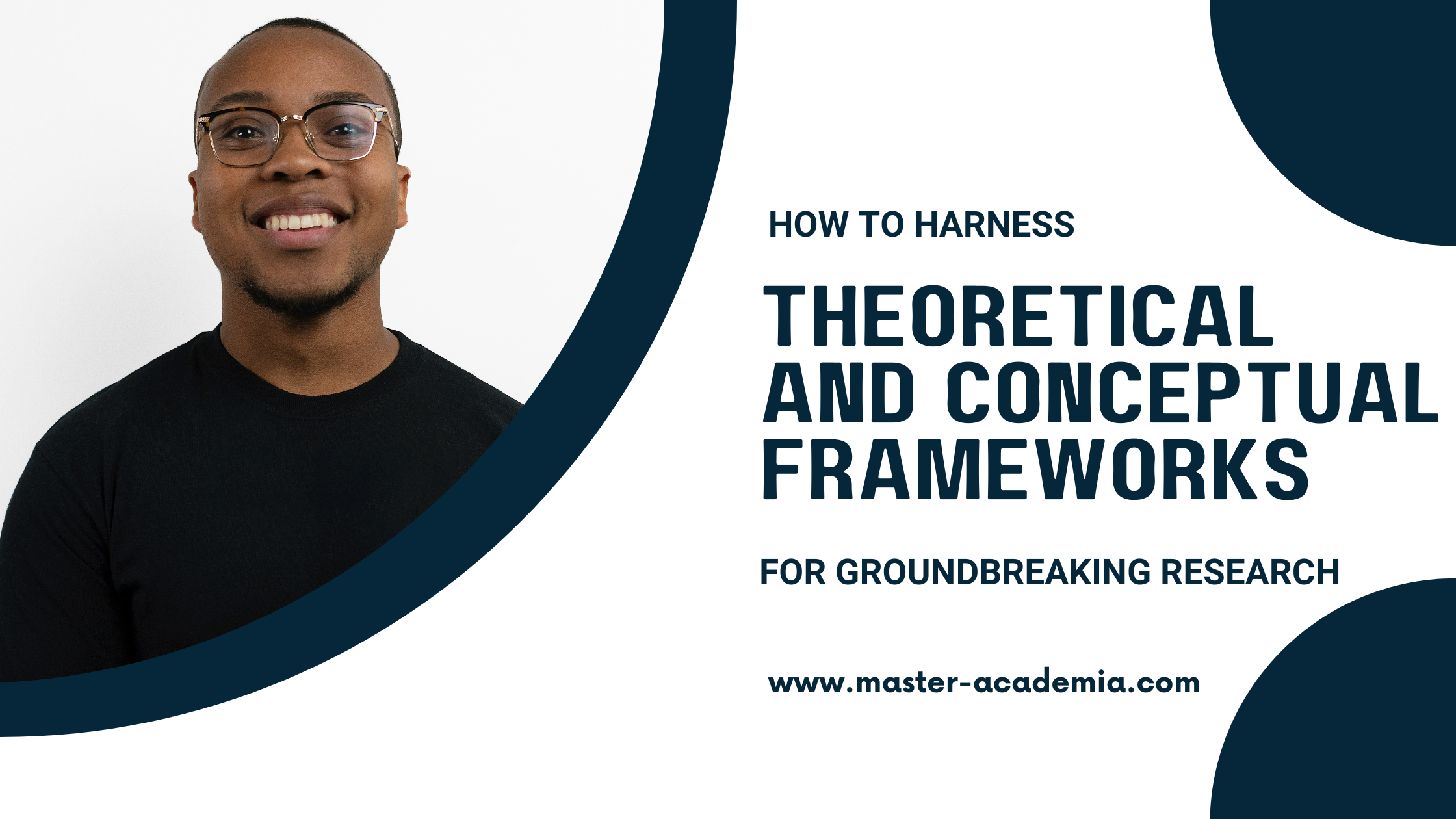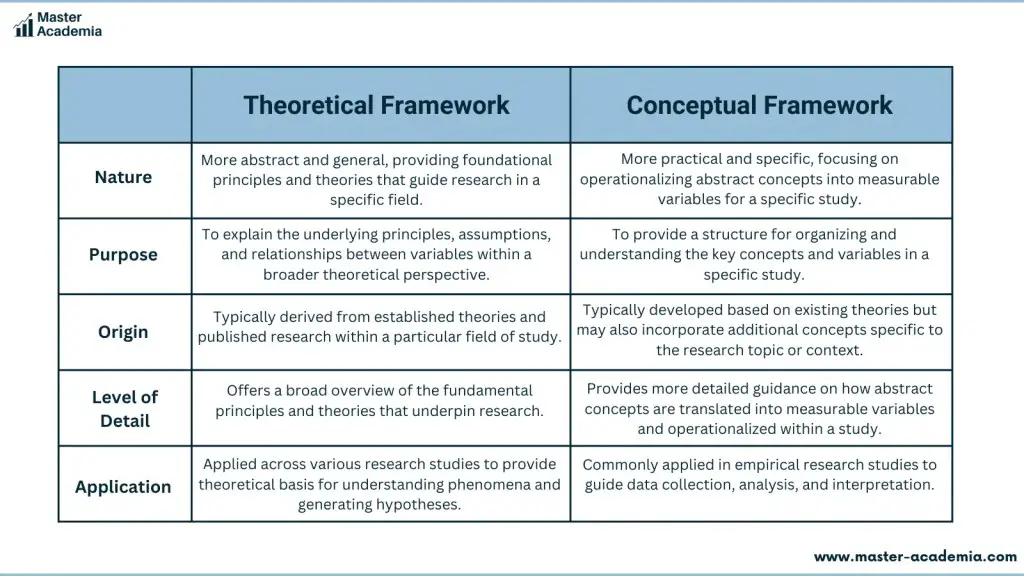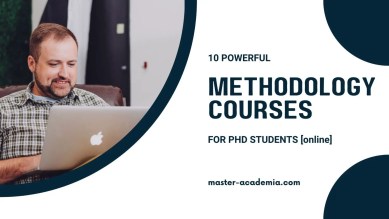
Unlock the power of theoretical and conceptual frameworks in your research. Learn to craft and apply robust structures that guide your studies with clarity and precision.
Contents
Theoretical frameworks: The backbone of research
Theoretical frameworks serve as the backbone of any research study, offering a lens through which data is examined and understood. Think of them as the academic framework that structures and bolsters your scholarly endeavors. But what exactly is a theoretical framework?
At its core, a theoretical framework outlines the theories that underpin your study. It’s a mosaic of concepts, models, and definitions that guide your analysis and interpretation of data. Imagine you’re an architect; your theoretical framework is the blueprint that ensures the building won’t crumble under scrutiny.
Key tasks of theoretical frameworks are:
- Delineating the scope: Theoretical frameworks help define the contours of your research, setting boundaries to focus your inquiry.
- Providing context: They offer a historical perspective, connecting your work to an established body of knowledge.
- Driving hypotheses: Theoretical assumptions lead to hypothesis formulation, shaping the direction of your research.
Here is how to construct a theoretical framework for your research:
- Identify the key theories and concepts related to your research question.
- Combine existing knowledge and identify patterns when synthesizing the literature.
- Articulate how these theories will influence your research design, data collection, and analysis.
- Ensure your framework is flexible enough to adapt as new insights emerge during your study.
🌟 Pro Tip:
Don’t shy away from complexity. Embrace multifaceted theories that can provide a rich analytical lens for your study.
You may also like: Theoretical vs. conceptual frameworks: Simple definitions and an overview of key differences
Conceptual frameworks: The map to uncharted territories
If theoretical frameworks are the backbone, conceptual frameworks are the cartographic blueprints for your research journey—they help you navigate through your study. These frameworks are not just about the what, but also the how and why of your research.
A conceptual framework is an analytical tool that knits together key variables and posits the relationship between them. It’s a strategic compass that points you in the direction of your research goals. Think of it as the map you sketch to explore new intellectual landscapes.
Key tasks of conceptual frameworks are:
- Visualizing relationships: A conceptual framework illustrates how different variables may interact within your study.
- Guiding analysis: A conceptual framework steers the analytical process, providing clarity to complex relationships.
- Facilitating communication: A conceptual model serves as a visual aid to communicate your research structure to others succinctly.
Here is how to construct a conceptual framework for your research:
- Define the variables that will be examined in your study.
- Develop a hypothesis or a set of propositions depicting the relationships between these variables.
- Utilize the conceptual framework to inform your research questions and objectives.
- Remember, your map should be both comprehensive and comprehensible—complex enough to capture nuances, yet clear enough to guide your research.
🌟 Pro Tip:
Aim for clarity and coherence in your conceptual map. A well-drawn map can illuminate the path to novel insights and discoveries.

Integrating theoretical and conceptual frameworks in research design
When theoretical and conceptual frameworks are integrated into research design, they work together to create a strong methodology. This integration ensures that the research design is not only coherent but also robust and systematic.
Well-integrated frameworks have the following benefits:
- Ensuring coherence: The integration aligns the research questions with methodologies and data collection strategies.
- Enhancing robustness: It establishes a strong foundation for your study, increasing the research’s academic rigor.
- Systematizing research: Well-integrated frameworks create a systematic approach to both qualitative and quantitative research.
In order to integrate theoretical and conceptual frameworks into research design, we need to operationalize concepts.
Operationalizing concepts: The process of research
Operationalization is the crux of research methodology, a process by which theoretical concepts are transformed into measurable variables. This rigorous procedure is fundamental for empirical investigation.
Here’s how to meticulously perform operationalization:
- Delineating Variables: Precisely delineate the variables and how they manifest in the tangible realm, ensuring clarity and precision.
- Selecting Indicators: Carefully select indicators that accurately represent fluctuations and nuances within the variables, ensuring the reliability and validity of the measurements.
- Measurement Procedure: Institute a meticulous measurement procedure, emphasizing uniformity and reproducibility in the research process.
- Accuracy and Consistency: Ensure that the operational definitions accurately represent and consistently measure the concepts they represent, ensuring the reliability and validity of the research.
The Interplay of theory and practice: Bringing concepts to life
The main challenge for any theory or concept is applying it in practice. This is where abstract ideas face real-world tests and must demonstrate their effectiveness. It’s the place where theory turns into practical wisdom.
To ensure your concepts make a mark on reality:
- Test your frameworks with real data. Do they hold up well when confronted with evidence?
- Be open to improving your theories based on practical experience. Being adaptable improves accuracy.
- Turn your observations into practical lessons that can guide future research or influence policy.
- The ultimate goal is to expand the body of knowledge with meaningful additions.
In research, theoretical and conceptual frameworks are vital guides. They light the way, define goals, and ensure that every study is grounded in scholarly knowledge.
🌟 Pro Tip:
Foster a two-way connection between theory and practice. Let each side support and enrich the other for a complete understanding.



